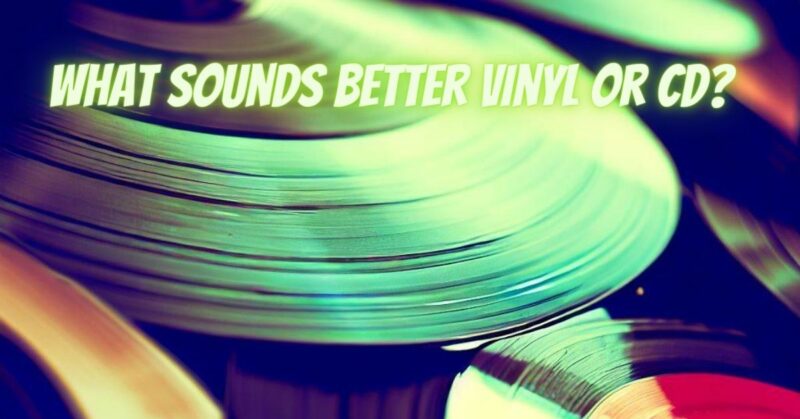The debate over whether vinyl or CDs offer superior sound quality has captivated audiophiles and music enthusiasts for decades. Each medium has its own unique characteristics that contribute to the listening experience, making the comparison a nuanced exploration of personal preferences, technical considerations, and aesthetic appeal. In this article, we delve into the key differences between vinyl and CDs to shed light on the ongoing discourse surrounding their sound quality.
1. Vinyl’s Analog Warmth:
Vinyl records are celebrated for their analog warmth and distinctive sound profile. The analog process of etching sound waves onto vinyl grooves imparts a subtle distortion that adds richness and character to the music. This warmth can create an emotional and immersive experience, especially for genres that rely on organic textures, such as jazz, folk, and classic rock. Many audiophiles appreciate the tactile engagement of vinyl, believing that its analog nature captures the subtle nuances of a performance more faithfully.
2. CD’s Digital Precision:
CDs, on the other hand, represent the pinnacle of digital audio technology. CDs offer a high level of precision and accuracy in sound reproduction, delivering a clean and clear sound that minimizes distortion and noise. Digital formats like CDs are capable of capturing a wide frequency range and preserving intricate details of a recording. This makes them particularly well-suited for genres that demand clarity and accuracy, such as electronic music, modern pop, and complex orchestral compositions.
3. Dynamic Range and Nuances:
Vinyl records are known for their broader dynamic range, which can provide a more natural representation of the ebb and flow of music. Vinyl’s analog preservation of dynamic shifts and nuances adds depth to performances, enhancing the listener’s connection to the emotional dynamics of the music. CDs also offer impressive dynamic range, although some argue that vinyl’s analog reproduction allows for a more nuanced and immersive experience in this regard.
4. Surface Noise and Artifacts:
Vinyl records can be susceptible to surface noise, crackles, and pops caused by imperfections, dust, and wear. This can impact the overall listening experience, detracting from the purity of the sound. In contrast, CDs have a lower susceptibility to such artifacts, offering a cleaner and more consistent listening experience.
5. Equipment and Environment:
Both vinyl and CDs require specific playback equipment for optimal sound quality. Vinyl demands a high-quality turntable, a calibrated tonearm, and a quality phono cartridge, all of which must be carefully maintained for peak performance. CDs require quality CD players or DACs (Digital-to-Analog Converters) to ensure accurate sound reproduction. The acoustic environment in which the music is enjoyed also plays a role, as the quality of speakers, headphones, and room acoustics influences the overall perception of sound quality.
The comparison between vinyl and CDs is not a straightforward matter of determining which format sounds objectively better. The decision is highly subjective and influenced by individual preferences, musical genres, and the emotional connection listeners seek. While vinyl offers analog warmth and an immersive experience, CDs provide digital precision and clarity. Both formats have their merits, and the ultimate choice rests on the listener’s priorities and the unique qualities they value in their music-listening journey.


